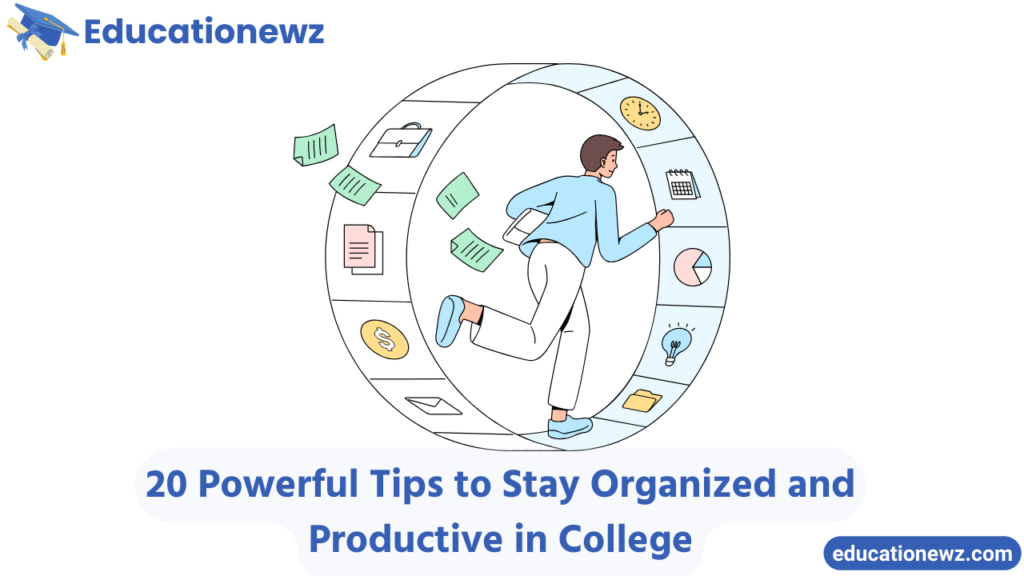To stay organized and productive in college, implement strategies like using planners, managing time effectively, and prioritizing tasks to keep a balanced and focused approach to your studies.
Starting college can be overwhelming. From managing assignments to balancing social activities, it’s easy to lose track of time and fall behind. However, staying organized and productive in college is not only possible but essential for success. It can make a significant difference in your academic performance, mental well-being, and overall experience. In this article, we will explore 20 actionable tips on how to easily stay organized and productive in college. These tips will guide you on how to manage your time effectively, prioritize tasks, and ensure that you stay on top of your studies while maintaining a healthy balance between work and life.
The Importance of Being Organized and Productive for Success
Being organized and productive is the cornerstone of achieving lasting success. When you create a clear plan and stay on top of your tasks, you eliminate unnecessary stress and avoid the chaos of last-minute cramming. Productivity isn’t about working harder—it’s about working smarter. By managing your time wisely and prioritizing effectively, you can tackle any challenge with confidence and efficiency. Staying organized gives you the freedom to focus on what matters most, empowering you to accomplish more while maintaining balance. With the right mindset and habits, you’ll not only reach your goals but surpass them, creating a path to success that feels both achievable and rewarding.
1. Set Clear and Achievable Goals

The first step in staying organized and productive in college is setting clear and achievable goals. When you have specific goals in mind, it’s easier to focus your efforts and measure progress. Break down your larger goals into smaller, manageable tasks, and assign deadlines to each. For example, if your goal is to achieve an A in a class, break it down into tasks such as attending all lectures, completing readings on time, and practicing problems daily. Setting clear goals helps you remain productive and organized throughout the semester.
- Tip: Write your goals down and keep them visible to stay motivated.
- Tool: Use apps like Google Keep or Todoist to track your goals.
By breaking down your tasks, you can focus on completing one task at a time instead of feeling overwhelmed.
2. Use a Planner or Calendar to Track Deadlines
A key aspect of staying organized and productive is using a planner or calendar to keep track of all your deadlines. With a hectic schedule filled with lectures, assignments, and extracurriculars, it’s easy to forget important dates. Having a physical or digital calendar helps you manage your time more effectively. You can use a planner or digital calendar app (such as Google Calendar) to mark all your assignment deadlines, exams, and events.
- Tip: Color-code your tasks to quickly identify high-priority items.
- Tool: Use digital calendars that sync across devices for easy access.
By having a visual overview of your commitments, you will be able to plan your week more effectively and avoid last-minute stress.
3. Prioritize Your Tasks
In college, you will often have many tasks to complete, but not all of them are of equal importance. Learning how to prioritize your tasks is crucial for staying organized and productive. The most effective way to prioritize is by urgency and importance. Use the Eisenhower Matrix, which divides tasks into four categories: important and urgent, important but not urgent, not important but urgent, and not important and not urgent.
| Priority | Task Example |
|---|---|
| Important & Urgent | Study for midterm, submit final essay |
| Important but Not Urgent | Start research for final project |
| Not Important but Urgent | Reply to emails, attend non-essential meetings |
| Not Important & Not Urgent | Watch a movie, attend a social event |
Focusing on the most critical tasks first allows you to stay productive and reduce procrastination. You’ll finish important work early, giving you time to tackle less urgent tasks later.
4. Create a Daily or Weekly Routine
Creating a structured daily or weekly routine can make it easier to stay on track. Setting aside specific time blocks for studying, socializing, exercise, and relaxation ensures that you maintain balance while staying organized and productive. A routine minimizes decision fatigue, as you know exactly what you need to do each day.
- Tip: Include a mix of activities in your routine, such as study sessions, physical exercise, and free time.
- Tool: Use a time-blocking technique to allocate specific time slots for each task.
Having a routine will help you avoid wasting time and allow you to make the most of every day in college.
5. Break Tasks into Smaller Steps
Large assignments can feel overwhelming. To stay organized and productive, break down bigger tasks into smaller, more manageable steps. If you have a research paper to write, divide it into stages such as brainstorming, outlining, writing the introduction, drafting body paragraphs, and editing. By working in smaller chunks, you’ll feel more in control and less likely to procrastinate.
- Tip: Set mini-deadlines for each task to stay on track.
- Tool: Use task management apps like Todoist or Trello to break down complex tasks.
This approach makes tasks feel less daunting and helps you build momentum as you make progress.
6. Declutter Your Study Space
A tidy environment fosters focus and productivity. A cluttered desk can distract you from your work, making it harder to stay organized and productive. Set aside time to clean and organize your study space regularly. Keep only the essentials on your desk, such as your textbooks, notebooks, and laptop.
- Tip: Organize your supplies into boxes or containers to avoid unnecessary clutter.
- Tool: Invest in a desk organizer to keep your work area neat.
A clean and organized workspace will help you concentrate better, allowing you to complete tasks more efficiently.
7. Use Digital Tools for Note-Taking

Digital note-taking apps such as Evernote, Notion, or OneNote are great tools for staying organized and productive in college. These apps allow you to store your notes, create checklists, and keep track of ideas all in one place. You can also search for keywords and tag notes to easily retrieve them when needed.
- Tip: Sync your notes across all your devices to access them anytime.
- Tool: Use Evernote’s web clipper to save articles and research for later reference.
Having your notes stored digitally means they’re always accessible, reducing the chances of misplacing important information.
8. Avoid Multitasking
Multitasking may seem efficient, but it often leads to mistakes and poor focus. To stay organized and productive, concentrate on one task at a time. When studying or working on an assignment, eliminate distractions such as your phone or social media. Completing one task before moving to the next will allow you to give your full attention and produce higher-quality work.
- Tip: Use apps like Forest or Focus@Will to block distracting websites.
- Tool: Use the Pomodoro technique to work in focused intervals (e.g., 25 minutes of work, followed by a 5-minute break).
By focusing on one task at a time, you’ll improve your efficiency and maintain a higher level of productivity.
9. Get Enough Sleep
Proper rest is essential for productivity. Sleep deprivation not only affects your health but also your ability to stay organized and productive. Aim for 7-9 hours of sleep each night to ensure you’re well-rested and ready to tackle your daily tasks.
- Tip: Set a regular sleep schedule and avoid late-night study sessions.
- Tool: Use a sleep tracker app to monitor your sleep patterns.
Good sleep boosts cognitive function, concentration, and overall well-being, making it easier to stay organized throughout the day.
10. Eliminate Distractions During Study Time
Distractions are one of the biggest barriers to productivity. Social media, notifications, and even noisy environments can interrupt your focus. To stay organized and productive, eliminate these distractions during your study sessions. Consider studying in a quiet place, using noise-canceling headphones, or turning off your phone to avoid interruptions.
- Tip: Create a “study zone” where you can work without distractions.
- Tool: Apps like Freedom or Cold Turkey can block distracting websites for set periods.
By creating a distraction-free environment, you’ll be able to concentrate better and work more efficiently.
11. Use the Two-Minute Rule
The two-minute rule is simple: if a task will take two minutes or less to complete, do it immediately. This approach helps you stay organized and productive by preventing small tasks from piling up. Whether it’s replying to an email, returning a call, or organizing a few papers, completing short tasks right away prevents them from becoming overwhelming.
- Tip: Keep a “two-minute” list of small tasks to do throughout the day.
- Tool: Use Google Keep to quickly jot down quick tasks.
This rule helps you stay on top of minor tasks, ensuring they don’t become major distractions.
12. Develop Healthy Study Habits
Good study habits are crucial to staying organized and productive. Developing these habits early in college will set you up for success. Whether it’s reviewing lecture notes daily, working on assignments as soon as they’re assigned, or practicing active recall, having healthy study routines will keep you on track.
- Tip: Create a study schedule and stick to it, treating study time as non-negotiable.
- Tool: Use apps like Quizlet to practice key concepts and test yourself.
By forming strong study habits, you can streamline your academic workload and improve your performance.
13. Take Regular Breaks
Taking regular breaks is essential for maintaining focus and productivity. Working for hours without rest can lead to burnout and reduced productivity. To stay organized and productive, use techniques like the Pomodoro method to take short breaks every 25 minutes of work.
- Tip: During breaks, do something relaxing like stretching, walking, or chatting with a friend.
- Tool: Set a timer on your phone or use a Pomodoro app.
Breaks help refresh your mind, ensuring that you return to your tasks with renewed focus and energy.
14. Stay Active and Exercise Regularly

Exercise is not just beneficial for your body—it’s also essential for maintaining mental clarity and focus. Regular physical activity improves cognitive function and reduces stress, helping you stay organized and productive in college. Whether it’s going for a run, practicing yoga, or hitting the gym, staying active can increase your energy levels and help you stay on top of your tasks.
- Tip: Schedule exercise into your routine just like any other important task.
- Tool: Use fitness apps like Strava to track your workouts.
Physical activity boosts your mood and productivity, ensuring you stay sharp and energized throughout the day.
15. Learn to Say No
As a college student, it’s easy to feel pressured to say yes to every opportunity, whether it’s social events, extra-curricular activities, or additional assignments. However, overcommitting can negatively impact your ability to stay organized and productive. Learn to say no when you’re overwhelmed or when an activity doesn’t align with your priorities.
- Tip: Politely decline invitations when you need time to focus on your goals.
- Tool: Use a calendar to assess your current commitments before accepting new ones.
Learning to say no ensures that you can maintain balance and focus on your most important tasks.
16. Maintain a Healthy Diet
What you eat affects your brain function and energy levels. Eating a balanced diet full of fruits, vegetables, protein, and whole grains will help you stay organized and productive throughout your busy days. Foods rich in vitamins and minerals promote mental clarity and focus, helping you stay sharp while studying.
- Tip: Avoid junk food and opt for brain-boosting foods like leafy greens, nuts, and fish.
- Tool: Use apps like MyFitnessPal to track your diet.
A healthy diet fuels your body and mind, giving you the energy to stay productive during the day.
17. Collaborate with Classmates
Collaborating with classmates on assignments or projects is a great way to stay organized and productive. By dividing the work, you can complete tasks faster and learn from each other. Group studies and collaboration foster accountability, ensuring that everyone stays on track.
- Tip: Use group messaging apps like Slack or WhatsApp to stay in touch with classmates.
- Tool: Use collaborative platforms like Google Docs to work together in real-time.
Working with others keeps you motivated and helps you stay organized by distributing the workload.
18. Stay Accountable
Accountability is key to maintaining productivity. Whether it’s through self-reflection or sharing your progress with a friend, staying accountable can help you stick to your goals and stay organized. Consider finding a study buddy or mentor who can check in with you regularly.
- Tip: Share your goals with someone who can help you stay on track.
- Tool: Use accountability apps like StickK to commit to your goals.
Accountability keeps you focused on your objectives, ensuring that you stay productive and organized.
19. Keep Your Digital Files Organized
In addition to your physical space, keeping your digital files organized is essential. Create folders for different subjects or projects and regularly sort through your files to avoid unnecessary clutter. By staying on top of your digital organization, you will save time searching for documents and resources.
| Type of File | Folder Name |
|---|---|
| Lecture Notes | Subject Name |
| Assignments | Subject Name |
| Projects | Course Name |
- Tip: Regularly back up important files to cloud storage.
- Tool: Use file management apps like Dropbox or Google Drive.
Having an organized digital workspace will save time and make it easier to find important documents.
20. Review Your Progress Regularly

To stay organized and productive, it’s essential to review your progress on a regular basis. Weekly or monthly check-ins will help you assess if you’re meeting your goals, staying on schedule, and maintaining a balanced lifestyle.
- Tip: Use a journal or planner to track your progress and adjust your plan if needed.
- Tool: Use apps like Habitica to track your habits and goals.
By evaluating your progress, you can make necessary adjustments and stay on track with your college commitments.
Frequently Asked Questions (FAQs)
- What is the best way to stay organized in college?
- The best way to stay organized is to use a planner or digital calendar to track deadlines, create a daily routine, and break tasks into smaller steps.
- How can I manage my time effectively in college?
- Prioritize tasks using the Eisenhower Matrix, set clear goals, and use time-blocking techniques to ensure you focus on important tasks first.
- How do I balance social life and academics in college?
- Schedule time for both studying and socializing in your routine. Learn to say no when necessary, and prioritize your academic goals.
- How do I avoid procrastination in college?
- Break tasks into smaller steps, set mini-deadlines, and eliminate distractions to stay on track and avoid procrastination.
- Why is sleep important for staying productive in college?
- Sleep enhances cognitive function, memory retention, and concentration, making it easier to stay organized and productive in college.
- How can I stay organized during a busy semester?
- Keep track of deadlines using a planner, prioritize tasks, and regularly review your progress to ensure you’re on track.
Conclusion
By embracing these tips, you’ll stay organized and productive throughout your college journey, paving the way for both academic excellence and a healthy work-life balance. Staying on top of your tasks will not only help you achieve your goals but also ensure you have time to recharge and enjoy life outside of the classroom. With the right strategies in place, you can navigate the challenges of college with confidence, reduce stress, and create a fulfilling, well-rounded experience. The key to success is working smarter, not harder, and these habits will help you thrive in every aspect of your life. Please follow our blog Educationewz.



